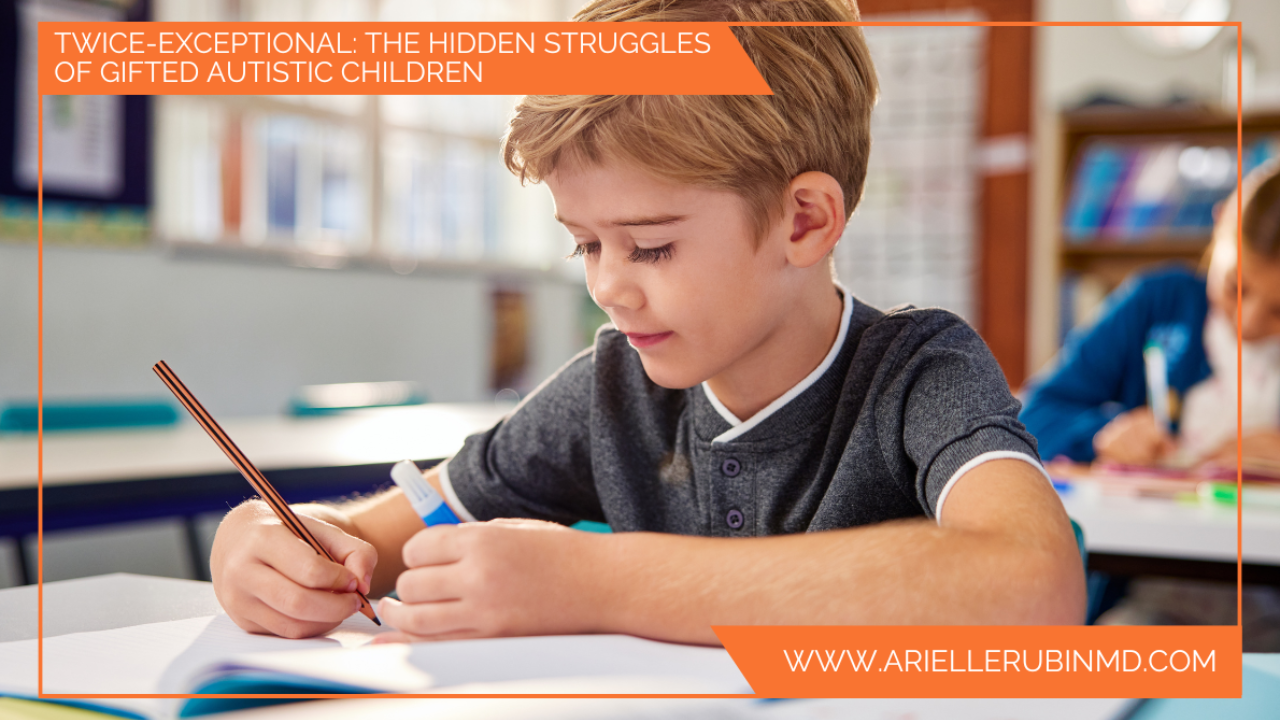Twice-Exceptional: The Hidden Struggles of Gifted Autistic Children
Apr 02, 2025
Giftedness is often seen as an advantage, but for autistic children who are also gifted—known as twice-exceptional or 2e—their intelligence can sometimes feel like both a gift and a burden. While these children may excel academically, they often struggle with perfectionism, anxiety, burnout, and social challenges that make their journey far more complicated than it appears.
In my psychiatric practice, I see many autistic gifted children and young adults who are struggling—not because they aren’t capable, but because their unique needs haven’t been recognized or supported. Parents are often caught off guard when their bright, articulate child suddenly becomes anxious, withdrawn, or even burnt out.
The Hidden Risks of Being Twice-Exceptional
Many parents and teachers assume that a child who excels academically doesn’t need additional support, but for autistic gifted children, that assumption can be dangerous. Here’s why:
- Early Academic Success Hides Executive Function Challenges – Gifted autistic children often breeze through school without needing to study, but this means they don’t develop the study habits or executive function skills needed for more challenging coursework. When they finally face difficulty, they often lack the tools to manage it, leading to frustration and self-doubt.
- Perfectionism and Burnout – Many twice-exceptional children develop a fear of failure because they are praised for their intelligence rather than their effort. This can lead to a toxic cycle of avoidance, procrastination, and burnout as they strive to meet impossibly high expectations.
- Social Isolation and Camouflaging – While some gifted autistic children find joy in their special interests, many struggle with feeling different from their peers. To fit in, they may mask their autistic traits, which can be exhausting and contribute to anxiety and depression.
- Sensory Sensitivities and Emotional Dysregulation – Autistic gifted children often experience heightened sensory sensitivity and intense emotions, making it difficult to navigate environments that are overwhelming or unpredictable.
How to Support Twice-Exceptional Children
Parents and educators can help twice-exceptional children thrive by recognizing and addressing both their strengths and challenges. Here are some key strategies:
- Redefine Success – Instead of focusing on grades or external achievements, encourage curiosity, creativity, and resilience. Praise effort, not just intelligence.
- Teach Study and Executive Function Skills Early – Even if your child doesn’t seem to need them now, helping them develop organizational and time-management skills will set them up for long-term success.
- Create Opportunities for Challenge Without Overwhelm – Gifted autistic children need stimulation but also require breaks to avoid burnout. Consider mentorship programs, interest-based learning, or advanced coursework tailored to their strengths.
- Help Manage Perfectionism – Encourage your child to take risks, make mistakes, and understand that failure is part of learning. Model self-compassion and talk openly about your own challenges.
- Support Social and Emotional Needs – Finding like-minded peers, whether through online communities, clubs, or special programs, can provide a sense of belonging. Therapy or social skills coaching can also be beneficial.
Join the Autism Roadmaps Community – Your Village of Support
Supporting a gifted autistic child can feel overwhelming, but you don’t have to do it alone. The Autism Roadmaps Community is a dedicated space where parents of neurodivergent children come together to share experiences, gain expert insights, and find practical strategies tailored to twice-exceptional kids.
🚀 Why Join? ✅ Gain expert guidance on supporting gifted autistic children
✅ Connect with parents facing the same challenges and triumphs
✅ Access proven strategies to help your child thrive emotionally, socially, and academically
✅ Be part of a compassionate community that truly understands your journey
✨ Don't navigate this path alone—join the Autism Roadmaps Community today! ✨
Final Thoughts
Twice-exceptional children don’t just need academic challenges—they need emotional and executive function support to truly thrive. By acknowledging the unique struggles of gifted autistic children, we can help them develop the resilience, self-acceptance, and skills they need to navigate both their strengths and their challenges.
Get notified when new blogs are posted and get exclusive insights by joining my weekly newsletter!

